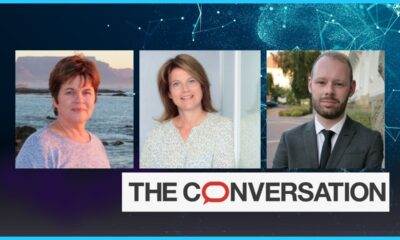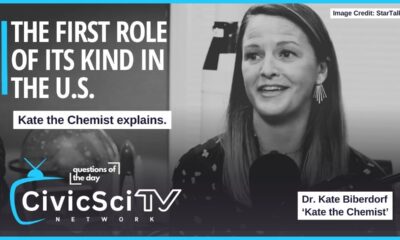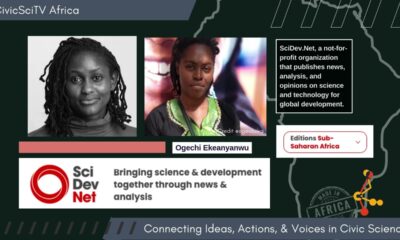Stories in Science Special Series
The words that changed my life

– Lia Paola Zambetti –
Senior Project Officer |Research Development and Collaboration |The University of Sydney
[dropcap]O[/dropcap]n a dull Saturday morning in the lab, I heard the words that changed my life. I had just finished changing the medium for my cells and was chatting with the only other person around, a senior postdoc from a different group. I started unburdening on my poor colleague, telling him how I was frustrated that very few people outside a small scientific community knew about our work. I was anxious because my postdoc contract was expiring and, faced with an impending deadline, I had a vague but gnawing feeling that perhaps I should finally take the plunge and leave the bench once and for all.

Lia Paola Zambetti
I mused that there must be a place for scientists who wanted to communicate their research rather than do it themselves. I knew scientists who wrote about science—I had done a little writing myself in the past as a hobby— and I began daydreaming about my ideal job. I imagined a role that encompassed various aspects of science communication, including writing articles for a general audience, editing technical manuscripts, and organizing science communication training for researchers. It was the first time ever that I articulated my perfect job out loud. Before that chat with my colleague under the hood, I only had rather vague and unconnected ideas about the next steps. My colleague brought me back to reality with a snap. “I don’t know about all that, but maybe someone else does,” he says. “You should tell all this to the director of our institute, exactly as you told me just now.”
The idea had not occurred to me, and I was hesitant. I knew our executive director only by sight and had never really talked to him before. I was going to ask a renowned scientist with a large lab advice on how to get out of research and do something so different from bench work – it didn’t sound very sensible after all. But, somewhat nervously, I made an appointment and went. At the meeting, I felt like I was rambling. I was sure that I was not clearly conveying what I wanted to say. Surprisingly, he took it in stride and let me talk.
All it takes to change your life is one random conversation under the hood.
At the end of my time slot, he told me that perhaps he knew just the person that may be able to help me. Less than a week later I was contacted by a communication director working in another part of our large organization. She asked if we could talk for 15 minutes or so. To my amazement, that quick chat turned into a two-hour conversation. She had been charged with setting up a new science communication office and was looking for scientists interested in working with her. She mentioned that the job would involve organizing conferences, being the editor for our institution’s journal, and implementing a science outreach program—and that, since we were just beginning, we could expand as we saw fit. It matched my wishes so well that it was uncanny. I didn’t dare hope that one conversation could transform my professional path. But almost two months, two more interviews, and a test later, I got the job!
It has been almost three years since I swapped pipettes and test tubes for meeting with scientists, writing and editing, and preparing presentations. For me, it was a change for the better. I particularly enjoy the varied tasks I am responsible for. On any given day, I may be organizing a talk or an outreach event in the morning and working as an editor or setting up communication training in the afternoon—and all the while I get to meet a huge number of new people and talk to scientists from all fields.
I am sometimes invited to events to share my career experience. I try to pass on the message that knowing—or imagining—what I wanted to do really helped. But it is not essential to have it all figured out right at the start. The main thing I always stress is that it is absolutely crucial to talk to as many people as you can, especially beyond your immediate colleagues, even when it feels odd, or unnerving – or apparently pointless. Anybody, especially someone not directly connected to us, will bring a new perspective to our problems and sometimes, all it takes to change your life is one random conversation under the hood.
Featured image is by Matt Walker69 from Flickr | Some rights reserved
Please review the story below by selecting an impact star factor.
The CS Media Lab is a Boston-anchored civic science news collective with local, national and global coverage on TV, digital print, and radio through CivicSciTV, CivicSciTimes, and CivicSciRadio. Programs include Questions of the Day, Changemakers, QuickTake, Consider This Next, Stories in Science, Sai Resident Collective and more.

-
Audio Studio1 month ago
“Reading it opened up a whole new world.” Kim Steele on building her company ‘Documentaries Don’t Work’
-
 Civic Science Observer1 week ago
Civic Science Observer1 week ago‘Science policy’ Google searches spiked in 2025. What does that mean?
-
Civic Science Observer1 month ago
Our developing civic science photojournalism experiment: Photos from 2025
-
Civic Science Observer1 month ago
Together again: Day 1 of the 2025 ASTC conference in black and white
Contact
Menu
Designed with WordPress
























